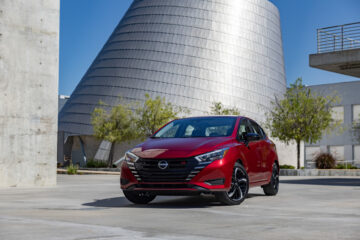The wide world of motorsports are like a farm filled with ripe fruit when it comes to automotive technological innovations. Everyday features we take for granted such as disc brakes, fuel injection, traction control and active suspension were once inventions that either improved safety or performance of race cars, or gave them an unfair advantage amongst the pack.
However, an automotive OEM giant seeks to transfer its expertise from the track to under the hood of the next generation of hybrid cars while hybrid cars remain hot.
Visitors visit the booth of Bosch Group at the 2023 Shanghai Auto Show in Shanghai, China, April 21, 2023.
As per Automotive News, the world’s largest auto supplier, Robert Bosch (better known simply as Bosch) is seeking to use its experience in the International Motor Sports Association (IMSA) SportsCar Championship as a blueprint for those in everyday passenger cars.
Currently, Bosch is the exclusive provider of hybrid power systems for cars running under the series’ Grand Touring Prototype (GTP) class, a division that consists of some of the most powerful cars ever built for brutal and grueling endurance races like the 24 Hours of Daytona, the 12 Hours of Sebring and 24 Hours of Le Mans.
The #10 Wayne Taylor Racing with Andretti Acura Motorsports ARX-06 driven by Filipe Albuquerque, Ricky Taylor, Brendon Hartley and Marcus Ericsson heads to Turn 11 in the MOTUL Course de Monterey on May 12, 2024 WeatherTech Raceway Laguna Seca in Salinas, CA.
Icon Sportswire/Getty Images
The German OEM provides teams powered by Cadillac, Lamborghini, Porsche, Acura and BMW with all the components needed to turn their screaming, gas-guzzling rockets into hybrids, such as inverters, electronic braking systems, hybrid control units and other components designed to allow the cars to beat the competition.
Bosch’s system adds up to 230 horsepower, which assists the car in getting up to speed out of the pit lane. With more than 350,000 race miles and 650,000 combined race and testing miles, Bosch is confident that its race-proven technology would also prove to be reliable for various automakers.
“Every lap is an opportunity to propose a new improvement or extend the limit just a little bit further on the technology,” Bosch Motorsport Director Jacob Bergenske told AutoNews.
CADILLAC RACING, Cadillac V-Series in action during the 100th anniversary of the 24 Hours of Le Mans at the Circuit de la Sarthe June 10, 2023 in Le Mans, France.
DeFodi Images/Getty Images
Bosch director of systems engineering Mohammad Fatouraie noted that the company is developing systems inspired by the race-bred hybrid system onto consumer-grade cars in the same way race car manufacturers have looked to the company as the “bread and butter” for hybrid components.
“We are not looking at the individual component. We’re not a components supplier. We are a holistic systems provider,” Fatouraie said.
“By knowing the whole system, you can right-size your component. You can increase the efficiency of the whole system but not over-sizing or undersizing the component.”
Working with manufacturers to make hybrid systems creates more efficient systems. In turn, by working alongside Bosch, automakers eliminate costs in development, savings from which can then be passed onto consumers to make hybrids more enticing for cost conscious consumers.
“If you’re decreasing the cost for the end consumer, you can increase the uptake of these technologies,” Fatouraie said.
More Automotive:
Maserati exec defends the use of a car feature drivers hateFeds are skeptical about the safety of popular driver-assist techYoung guys who like loud cars are likely to be psychopaths, study suggests
A ripe time for hybrids:
2025 Honda Civic Hatchback Sport Touring Hybrid
Honda
Bosch’s move comes at a time when automakers are scaling back their electric vehicle plans in lieu of adding hybrids to their lineup.
The 25-year old technology has been a home run for automakers such as Japanese powerhouse Honda. Recently, they unveiled a new hybrid version of their popular Civic; of which they anticipate will make up about 40% of the nameplate’s sales this year.
Currently, hybrid models make up a quarter of total sales for the automaker, led by hybrid versions of the popular Accord sedan and CR-V SUV.
More controversially, Porsche unveiled a hybrid version of its popular 911 sports car, which is faster and more efficient than previous iterations while keeping the car lightweight and compliant with tightening emissions regulations.
However, not all automakers are that tight about hybrid technology. Fresh off a 10-day trip to China, Ford CEO Jim Farley noted that a popular kind of car in the People’s Republic called an Extended Range Electric Vehicle (EREV) may be a better solution.
“EREVs in the U.S. could be 120 miles of all-electric, and they drive like EVs,” Farley said. “They don’t drive like combustion engine vehicles, so you get an EV, and you have 700 miles of range. You don’t have range anxiety for a long trip. You don’t have to rely on any charges. And those vehicles have half the batteries, so they’re very profitable.”
“It’s a good solution, that’s why it’s popular in China, that’s why it’s doubled its sales in China and we really like that solution.”
Related: Veteran fund manager picks favorite stocks for 2024


